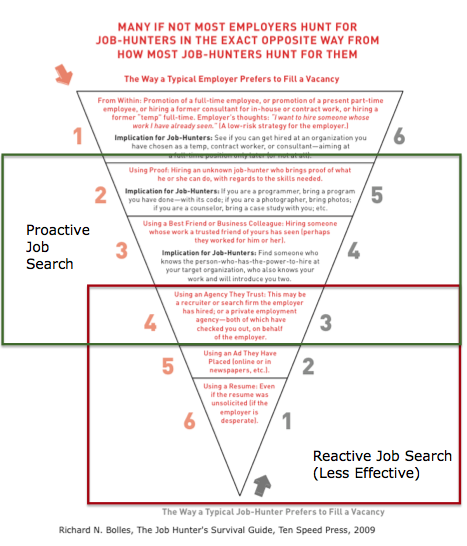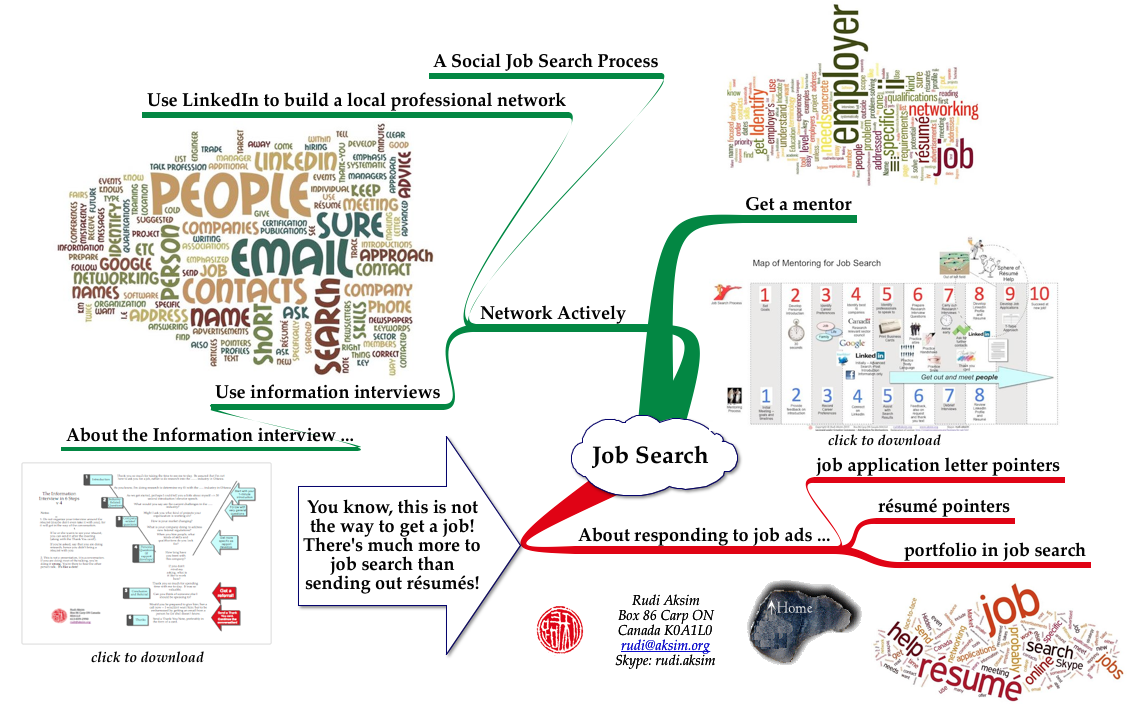Job Search Contents
Strategic Networking is Critical
As will be apparent from the above, I truly believe that writing applications to job ads and sending in résumés is not an effective approach to job search. Rather, I recommend a social approach, in which you seek out informants in your line of work and then design your job search around what you learn from speaking to them. My experience is that this gives you access to the 85% of jobs that are never advertised!
Think about it for a moment: if an employer has a new position to staff, what does the employer want to do?
The employer wants to promote from within, of course, since he or she knows that person, knows their strengths and weaknesses for that person has a track record with the organization.
If that's not possible, what will the employer do next? The employer will call on people whose opinion he or she trusts for recommendations. Often companies have incentive programs for their employees to recommend new hires, for that reason. Or the employer will call other contacts outside the company for recommendations.
If all this doesn't work, then the employer will consider advertising the position. The last thing an employer wants to do is hire a new person on the basis of a résumé and interview. Someone else may have written the résumé and the person may have been coached to present themselves in the interview as a completely different person from what he or she really is.
The employer, thus, only advertises a position as a last resort (it costs money, after all and then there's the problem of sorting through the 600 responses, 95% are not relevant.)

Richard Bolles, in his excellent 2009 book, The Job Hunter's Survival Guide, illustrates this problem with the inverted triangle below. The purpose of a social approach to job search is to move you from the bottom (reactive job search) box into the proactive job search area (the green box), where you are potentially being recommended by people you have met through networking.

So, if you sit at home, monkeying with your résumé and responding to job ads only, you're competing with lots of people for 15% of the available jobs!
If it's not clear to you how to use the materials below or to act on this advice, find a mentor or get in touch with me and let's see what we can do together for your job search.
- A Social Approach to Job Search
- Map of the Job Search and Mentoring Process (as I see it)
- Use LinkedIn to Establish your Local Professional Network
- 10 Points about the information interview (the key to job search, I think)
- How to conduct the information interview

Get a Mentor
A mentor can be a friend, someone you know in your industry or profession, or someone matched with you by one of the organizations in Ottawa who arrange mentorships, such as In-TAC or OCISO. The important thing is that the person be prepared to work with you, to give you a chance to practice your short personal introduction (elevator speech), information interviews, interview answers and techniques and, perhaps, help you find industy contacts.
Responding to Job Ads
My key advice is that you should not jump into preparing your résumé until you have had some conversations with informants: they are the people who can tell you what to emphasize and present in your résumé. After you have learned what's happening in your field from informants, you may want some pointers to help you edit your résumé. My advice, however, is to speak to informants in your industry before your write your résumé. Or your LinkedIn profile, for that matter..
Under the same conditions, here is some editing advice for your job application letter.
